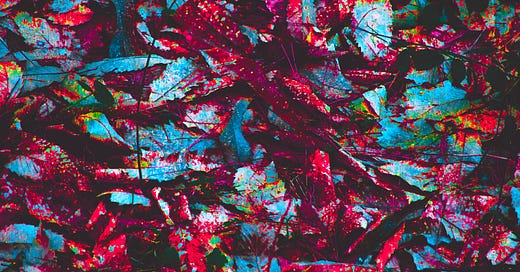the capacity to introspect,
an internal voice
that sparks the consciousness
within —
it is the me that makes me me
it is the truth
in all of my interior musings
— could this conscious flow
have been triggered by a breakdown?
a rupture in the dam, the barrier
between right and left —
the severed connection between
logic and insight,
voices from the heavens
igniting a blaze of new sensations,
social percepts, and theories
of other minds…
the recognition of a self —
not a schizophrenic split,
but a breakthrough to a new
humanity!
a new awareness
of the possibilities
of freedom and force,
of agency and vivid life…
in all this time, how has
science not come to understand
the voice?
the inner monologue…
the stories we tell ourselves…
the narrator and the narrative
in one sentient mind…
how is it that
there is something so intimate
buried deep in the hard problem?
how is it that we feel
subjectivity at all?
why are we not mindless
walking ape-like monsters?
it is language and metaphor
and it is poetry to suspect a depth
and substance to this fleshy blob
housed inside our skulls…
in all our guilt and fears, our sadness
and vitriol, our elation, our jealousy,
and even our pride…
can it all be the truest hallucination?
I know these mental acts
are my life-blood, my thumos, my verve,
even more than my real blood…
so take it!
bring it back with you to your own cave,
your neural palace,
and dance with these cerebral spirits
all night long
“The first poets were gods. Poetry began with the bicameral mind. The god-side of our ancient mentality, at least in a certain period of history, usually or perhaps always spoken in verse. This means that most people at one time, throughout the day, were hearing poetry (of a sort) composed and spoken within their own minds.”
― Julian Jaynes, The Origin of Consciousness in the Breakdown of the Bicameral Mind
Garbage Notes:
One of my favorite non-fiction books is The Origin of Consciousness in the Breakdown of the Bicameral Mind by Julian Jaynes. It explores an interesting theory about the point in human evolution when our species began to exhibit self-reflective thought—in other words, our ability to introspect.
Consciousness is kind of an icky term—particularly within the biological sciences. I know there’s a whole cottage industry of gurus and mystics who’ve co-opted the concept of consciousness to mean something else—something magical or spiritual. But I’m not talking about that woo woo shit.
I’m talking about the very real neuropsychological phenomenon of subjectivity.
In a very basic sense, consciousness is the ability to be self-aware. It goes hand in hand with things like autobiographical memory and self-referential language. It’s also intimately tied to cognitive skills like theory of mind, perspective taking, and empathy.
Julian Jaynes claims that there was a point in history when humans were not conscious the way we are now. He says that for a large chunk of homo sapiens’ existence, we were subjectively blank inside.
He discusses archeological, anthropological and even literary evidence while drawing parallels between psychiatric conditions such as schizophrenia to come to the conclusion that at some point in time (around the 2nd millennium BCE) humans began to hear voices.
Today we’d consider this our inner monologue. But back then the voices weren’t perceived as originating from within our minds. Instead they were more like scary auditory hallucinations—like gods commanding us to do things.
Jaynes refers to this crude non-conscious mental state as the bicameral mind—and it’s the transition from blankness to hearing voices that represents the breakdown.
So we go from basically being like walking zombies to eventually having these rich internal lives that are so deep and dynamic that we can’t help but share with one another all the heartfelt shit that makes us who we are.
Over time everything becomes more fully realized. Culture and language spread. Ideas and problem-solving become more complex. Societies interact with one another and we learn from each other—thus consciousness has fully emerged.
We now share stories. We write poetry. We sing songs and make really fantastic art and stuff—you know, all the fun things that we like to post on Substack.
As a theory—a little wacky, I know. But I’ve always been intrigued by it. It’s probably one of the more tantalizing takes on consciousness. But at the same time it’s controversial. It’s kind of difficult to disprove. And it relies on a great deal of backwards inference and speculation.
Yeah, it’s the speculation—that’s probably why I like it so much.
As you can tell, it was the Jaynes book that inspired this poem. I was reflecting on how important it is for me as a human being to be able to self-reflect and be conscious.
I’m very introspective. Always dreaming up worlds. I can’t even imagine walking around without an internal state. It’s the cornerstone of my identity. And it’s why I draw so much meaning from language and metaphor.
Plus, I’m always thinking about my own thoughts—reflecting on my stories and poetry, and how it all originates inside me. It’s what I do here in Garbage Notes. And I’m not ashamed of it.
To be lost in your own mind is a truly beautiful thing.
Franco Amati 2024
If you enjoyed this piece, a paid subscription would be the best way to show your support. But if you aren’t ready for that sort of commitment yet, you can always send me a one-time donation on my Ko-fi page.





I've gotta read that book now.
I vaguely remember learning about this in an human anthropology class back in college. But back then I zoned out because it was explained poorly. But you make actually seem cool and understandable enough to make me want to check out the book. Thank you